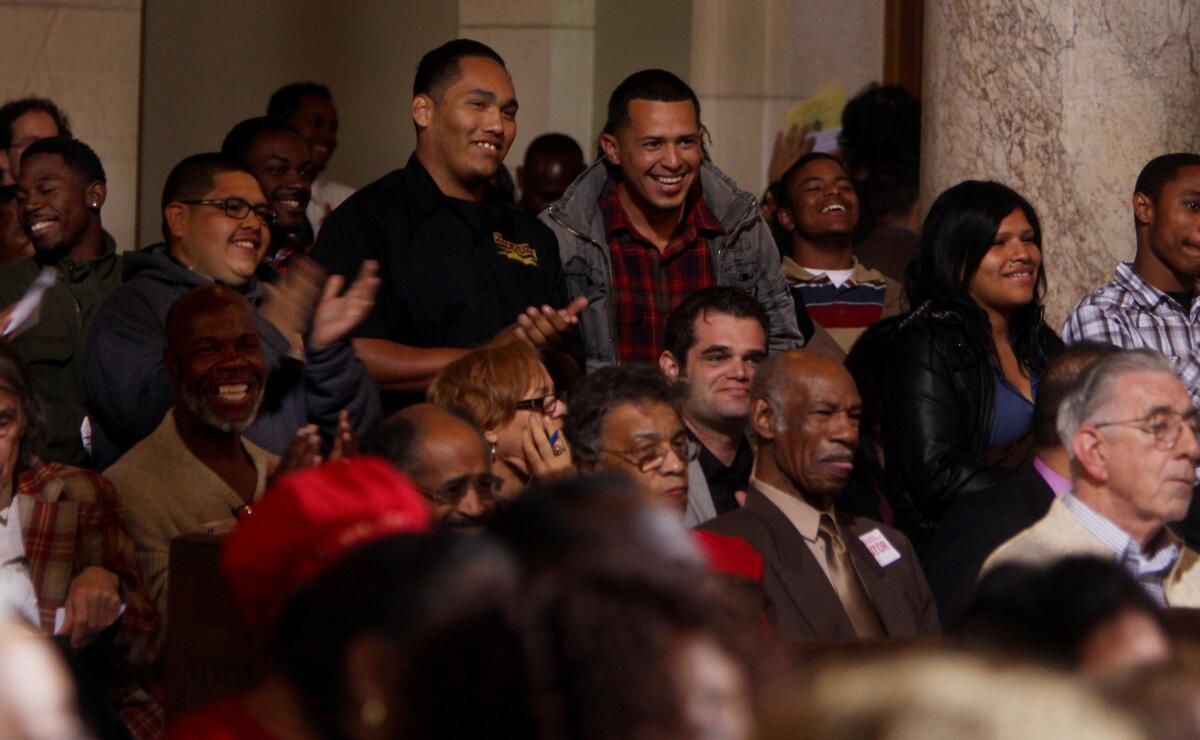Winners of free-speech suit against L.A. are awarded only $2

- Share via
Two men who were repeatedly kicked out of Los Angeles City Council meetings for violating public comment rules won part of a free-speech lawsuit against the city last year. But a jury recently awarded them only a few dollars for their trouble.
The meager awards are the latest turn in a long-running case that pitted the Venice Beach performers against council rules banning “personal, impertinent, unduly repetitive, slanderous or profane remarks.”
Like many government bodies across the country, the council has often wrestled with how to regulate public comments and keep meetings orderly. Some politicians complain that L.A. council meetings have at times devolved into a “circus.”
“We allow people to curse at the council. We allow them to wear dollhouses strapped to their heads. We aren’t that tight on it,” Councilman Paul Koretz said. “Yet we still have a constant battle” over what is allowed.
In August, a federal judge in Los Angeles ruled that the city had repeatedly run afoul of the 1st Amendment in enforcing its Rules of Decorum, cutting off or ejecting two activists from meetings dating from 2009. In several instances, the men were temporarily banned from speaking at city meetings.
In a separate action last week, a jury concluded that Matt Dowd and David “Zuma Dogg” Saltsburg — who once ran for mayor against Antonio Villaraigosa — had not proved that they suffered “actual injury” from the unconstitutional use of the meeting rules and granted them only $1 each in nominal damages.
“I’m just stunned and appalled that a jury of American citizens can think that banning someone from speaking in a public meeting … is not worth anything,” Dowd said in a telephone interview from New Zealand, where he now lives. “The city — they feel like they got away with it — even though they lost.”
The decision could still cost taxpayers: Civil rights attorney Stephen Rohde said he would seek to recover legal fees from the city but declined to estimate how much. He estimated that he and three other lawyers spent more than 1,500 hours among them on the case. The city has already paid more than $450,000 to outside attorneys to help handle the matter, according to a spokesman for City Atty. Mike Feuer.
Such cases “often are not necessarily about the money,” Rohde said. “My hope is that the city will take the 1st Amendment seriously.... That will be the vindication for these plaintiffs.”
The federal judge did not find that the city rules themselves violated the 1st Amendment right to freedom of speech, as Dowd and Saltsburg had argued. However, the judge warned that “because of its phrasing, it is easy to apply the Rule in an unconstitutional manner.” His decision hinged on whether the rules were interpreted to require “an actual disruption,” not just language that was “impertinent” or objectionable.
The judge found there was “an unconstitutional application” of the rules against Dowd and Saltsburg at a string of meetings. In one such case, Dowd complained that the council “president is pathetic and hopeless and is not doing a very good job and you need to get together and lose her.” That prompted a city attorney to advise the council that Dowd shouldn’t engage in personal attacks, according to the decision.
Dowd countered that he wasn’t directly talking to the president, then used an expletive when complaining about rules governing public conduct along the Venice Beach boardwalk. The council dismissed Dowd from the meeting and voted to ban him from speaking at future meetings for 30 days.
The city argued Dowd was disruptive. But criticizing how the council president did her job “is political speech at the heart of the First Amendment,” U.S. District Judge Dean D. Pregerson ruled. Profanity seems to be what ultimately spurred the council to ban Dowd, but profanity alone isn’t reason to remove someone, the judge concluded. The council “cannot sacrifice political speech to a formula of civility,” he wrote.
In the same decision, Pregerson ruled that the city could not ban the use of amplified sound in designated areas of the Venice Beach boardwalk but backed other restrictions on boardwalk performers and vendors — which spurred the performers’ complaints against the city. Dowd, Saltsburg and other Venice performers who filed the lawsuit were also awarded $1 each in nominal damages related to the sound restrictions. The total payout was $10.
The Rules of Decorum haven’t been altered since the court decision. Pregerson wrote that the city “would do well to consider revising the rules” to make it clear that nobody can be ejected before causing “an actual disruption.”
Bardis Vakili, staff attorney for the American Civil Liberties Union of Southern California, said the wording in the existing Los Angeles rules could be used to chill criticism. “Nobody would ever accuse you of being ‘impertinent’ when you’re praising the City Council,” Vakili said. His group has challenged similar rules in Orange County.
City attorney spokesman Rob Wilcox said now that damages have been assessed in the case, city lawyers will evaluate the verdict and advise the council on whether any changes are needed.
For cities, “it’s a balancing act,” said Tracy Westen, chief executive of the nonprofit Center for Governmental Studies. “The City Council can probably censor people if they’re off topic and dramatically wasting time, if they’re so loud that it’s disruptive. But they have to give them considerable latitude under the 1st Amendment to express their views.... It’s very difficult to say, ‘You can’t talk.’”
More to Read
Sign up for Essential California
The most important California stories and recommendations in your inbox every morning.
You may occasionally receive promotional content from the Los Angeles Times.











